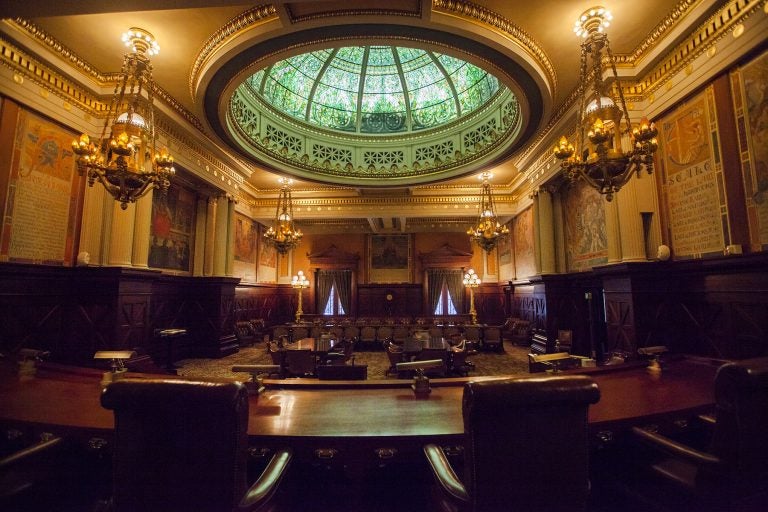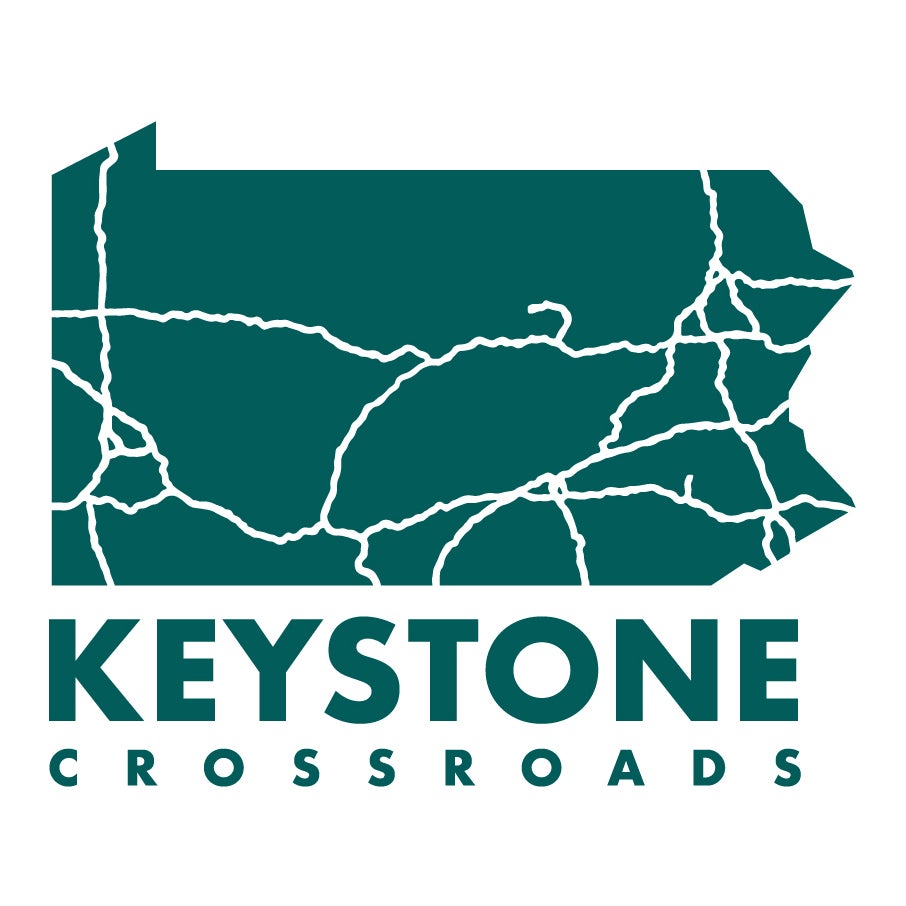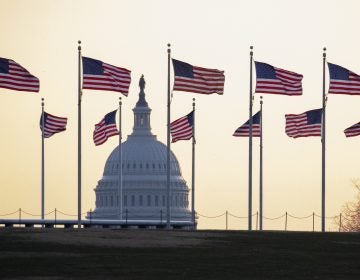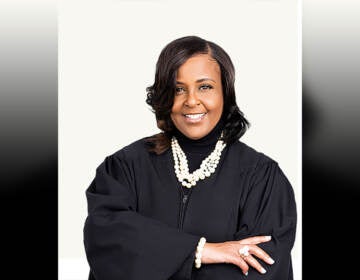A voter guide to Pennsylvania’s 2021 judicial elections
Voters will elect a slew of judges to Pennsylvania’s three statewide appellate courts — judges who will shape important policy in the state for at least a decade.

The Pa. Supreme Court in Harrisburg. (Christine Baker/PennLive)
Pennsylvania has begun sending out mail ballots for next month’s election, where voters will elect a slew of new judges who will play key roles in shaping policy for at least the next decade on three statewide appellate courts.
But while these judges wield considerable power, their elections tend to get little attention from voters. In the last two judicial election years that featured partisan contests, turnout hovered in the low 20% range, compared with more than 70% turnout in 2020’s record-setting election.
In Pennsylvania, judicial hopefuls run in partisan, statewide elections. After serving a 10-year term, they run in nonpartisan, yes-or-no retention elections, which they almost never lose. In many other states, judges are elected in nonpartisan contests, or are selected based on merit by a commission or governor and legislature.
In Pennsylvania, the partisan election means judges must run under the umbrella of a political party, raise money through campaign committees, and collect endorsements from political groups. There are crucial differences from other political races, though. Judicial candidates aren’t allowed to solicit donations directly. They also can’t promise to rule a certain way on any specific issues.
Below is a guide to the roles and recent histories of the courts, and the candidates who are hoping for a chance to shape them.
The Pennsylvania Supreme Court: What is it? Who’s running?
Two judges — a Republican and a Democrat — are trying to snag a single open seat on Pennsylvania’s highest court.
Currently made up of five Democrats and two Republicans, the Pennsylvania Supreme Court calls itself the oldest appellate court in the country. Its job is to hand down final rulings on cases appealed from lower courts and — like the U.S. Supreme Court — it can usually choose the cases it accepts.
A seat is open because Chief Justice Thomas Saylor, a Republican, has hit the court’s age limit of 75 and has to retire. Democratic Justice Max Baer is assuming the role of chief justice.
The candidates are:
- Maria McLaughlin, a Democrat from Philadelphia who has served on the Superior Court since 2017, began her legal career as an assistant district attorney in Philly, before serving in the family division of the city’s Court of Common Pleas.
- Kevin Brobson, a Harrisburg-area Republican who took a seat on the Commonwealth Court in 2010, and previously worked in private practice, practicing commercial litigation and administrative law for the firm Buchanan Ingersoll & Rooney.
McLaughlin was the sole Democrat in her primary, and so she enjoyed the full support of her party and is coming into the general election with a strong campaign war chest. She had over a million dollars on hand at the end of the campaign finance filing period ending September 13, much of it in small dollar donations. Her biggest contribution from a PAC was $500,000 from the Committee for a Better Tomorrow, which is run by the Philadelphia Trial Lawyers Association.
Brobson got his party’s endorsement in the primary, and ultimately won a decisive victory over two other GOP candidates — besting Commonwealth Court Judge Patricia McCullough and Philadelphia Court of Common Pleas Judge Paula Patrick with 52% of the vote.
He had about $224,000 on hand at the end of the last campaign filing period. Some of his biggest contributions have come from the Commonwealth Leaders’ Fund, a school choice PAC closely tied with Pennsylvania’s richest person, Jeff Yass. The PAC gave him nearly $30,000 in donations and an in-kind contribution valued at nearly $295,000.
Other big donations included $25,000 from the Build PA PAC, which is a political committee for State Senate President Pro Tempore Jake Corman, and $50,000 from the PA Future Fund, a PAC dedicated to electing Republicans in Pennsylvania and run by Asher’s Chocolates scion and longtime Southeast Pennsylvania conservative heavyweight Bob Asher.
The Pennsylvania Bar Association has given both Brobson and McLaughlin “highly recommended” ratings, its best assessment.
What are some of the biggest recent decisions by the Pennsylvania Supreme Court?
The Pennsylvania Supreme Court has become a lightning rod in the last several years.
The current state of partisan tension dates back to 2015, when Republicans lost control of the high court during a tumultuous period involving revelations that several judges had been exchanging offensive emails.
Since then, the GOP has chafed at decisions made by the Democratic majority, which have included an order to redraw the commonwealth’s congressional districts after a ruling that they were unfairly gerrymandered to favor Republicans.
The move ultimately made Democrats much more competitive in congressional elections. Before the change Republicans held a 13-5 advantage in the Pennsylvania congressional delegation. Since the new map went into effect just ahead of the 2018 midterm, there has been a 9-9 partisan balance.
“What the court has done is truly breathtaking,” U.S. GOP Sen. Pat Toomey said during a rare visit to Harrisburg after the decision that year. “When the Pennsylvania State Supreme Court violates the law, violates the constitution as they have done in this case, then there is a terrible miscarriage of justice.”
There was also mass GOP pushback against the high court’s decision ahead of the 2020 election allowing emergency changes to voting laws.
After the election, state judges — some Democrats, some Republicans — handed down near-universal dismissals of the flood of lawsuits by the Trump campaign and other Republicans that made baseless allegations of widespread election fraud and sought to get the results reconsidered or overturned. Former President Donald Trump’s campaign lost all of its cases that made their way to the Pennsylvania Supreme Court.
How have political leanings played into candidates’ past rulings?
Even when there’s some political harmony in the commonwealth, running for any judicial seat often means walking a thin line between courting donors and voters, and staying above the political fray. In a forum hosted by Pennsylvanians for Modern Courts during the primary, both Brobson and McLaughlin said the system can be fraught.
McLaughlin insisted that she wants to be a judge, not a politician, but “in Pennsylvania, that’s how you get there.” Brobson said he tends to “bristle” when coverage of rulings notes the judge’s party, because “we need to make sure Pennsylvanians have faith that politics is not playing a part in the judiciary.”
Despite those promises to be fair and nonpartisan, both judges have been caught up in politicized cases and made decisions that — even if they were not politically motivated — conformed with their parties’ positions.
Brobson, who has called himself a “strict constructionist” who believes in “the separation of powers … judicial restraint … [and] reading laws as they’re written,” decided several high-profile cases involving the counting of ballots in the 2020 election.
In one case, he took a measured approach to a GOP attempt to invalidate ballots that had been fixed by voters, ordering them not to be immediately thrown out, but to be segregated from other ballots. In a subsequent case, he ruled in favor of Republicans who wanted to toss out more than 2,000 mail ballots that had been submitted without dates.
As a Superior Court justice, McLaughlin, who has said she has no plans to ever “legislate from the bench,” is caught up in explicitly political cases less frequently than her colleagues on the Commonwealth Court. But along with two other judges, she did preside over a recent, high-profile case that echoes a national conversation about sexual assault.
The rest of the panel ruled that a conviction should be thrown out because the accuser, a University of Pittsburgh student, testified that she didn’t remember the evening in question and she appeared to show some awareness of her situation in a recording from the evening.
McLaughlin dissented. The accused, she said, “testified that he recorded the encounter with the victim in case there was any question of the voluntariness of the intercourse … that damning testimony was enough for the jury to find that [the accused] knew the victim could not properly consent. Why else would he create a record to protect himself?”
How is the GOP hoping to erode Democrats’ sizable advantage on the court?
With their chances of retaking the court virtually zero until at least 2025, when Democratic justices face retention elections, Republicans in the state legislature have launched a plan to totally remake the court through electing judges by region.
Their proposed constitutional amendment could force more than one Democrat off the court by requiring justices — who are currently concentrated in cities — to run in geographic districts drawn by the legislature.
Deborah Gross, who heads the advocacy group Pennsylvanians for Modern Courts, says the plan “would completely destroy judicial independence” and “make judges legislators.”
It already passed the GOP-controlled House and Senate once. It’s now being considered for a legislatively-required second time. If it passes both chambers again without changes, it will go directly to voters for a referendum vote.
The Pennsylvania Superior Court: What is it? Who’s running?
Let’s face it: Campaigns for Pennsylvania Superior Court judge aren’t exactly glamorous. Voters often pay little attention to such races, and seeking one of the statewide appellate court’s 15 seats is about as exciting as running for county judge, only with steeper turnpike tolls.
Whoever wins a 10-year term to fill the lone vacancy on the Pennsylvania Superior Court may not get a lot of press coverage, but they will play a huge part in how justice is carried out across the commonwealth.
“It’s the busiest appellate court in the country. It handles over 8,000 cases a year,” Gross said. “And it is a court of last resort in many cases, because the Supreme Court has discretion to take a case or not, but the Superior Court doesn’t have that choice.”
Superior Court judges, usually seated in three-judge panels, hear appeals from criminal, family, and civil cases handled by county courts of common pleas. Most of the job involves workaday reviews of those lower-court decisions, and even rulings that set a precedent may not last: The state Supreme Court can take up appeals of Superior Court rulings, though it doesn’t often choose to do so.
With Superior Court Judge Susan Gantman preparing to retire, there’s one open seat to be claimed. The Democratic candidate is Timika Lane, a Common Pleas Court Judge who handles criminal matters in Philadelphia. She previously worked in the Public Defender’s office and practiced family law as a private attorney.
Lane beat two other Democrats in a three-way primary, coming away with nearly 49% of the vote over Pittsburgh civil litigator Jill Beck and commercial lawyer Bryan Neft.
Lane now faces Republican Megan Sullivan in the general election, who coasted to primary victory as her party’s only candidate for the open seat. Sullivan prosecuted child abuse cases for the Chester County District Attorney’s Office and later focused on insurance fraud as a Deputy Attorney General for the state.
Both candidates received “recommended” ratings from the Pennsylvania Bar Association.
Sullivan had $228,000 on hand at the end of the last filing period, and her big donations included $10,000 from Build PA, Sen. Corman’s PAC, and $10,000 each from Philadelphia’s Sprinkler Fitters Local Union No. 692 and Steamfitters Local 420. Dave White, a GOP candidate for governor with strong Steamfitters ties who owns a large Delaware County HVAC company, also gave $10,000.
Lane ended the last reporting cycle with a little under $200,000 on hand. Her biggest contributor was, like McLaughlin in the Supreme Court race, the Philly Trial Lawyers’ Committee for a Better Tomorrow, which gave her $150,000. She also got $25,000 from Philadelphia’s Laborers District Council, and $10,000 from the city’s firefighters and paramedic union.
Gross, of Pennsylvanians for Modern Courts, says that judges “shouldn’t be influenced” by such money, but “it’s something you can take into consideration.”
But, she adds, “I honestly think most candidates who run for judge would prefer to not be involved in politics. I’ve heard candidates and judges say, ‘If I had known the craziness of campaigning for judge, I never would have done it.’”
What are some noteworthy decisions by the Pennsylvania Superior Court in recent years?
The Pennsylvania Superior court can be a “farm team” for the state’s top tribunal: Five of Pennsylvania’s seven current Supreme Court justices served on Superior Court first. And the lower court’s rulings can make headlines while making law.
In 2019, for example, a unanimous Superior Court ruling tossed out a drug- and gun-related conviction of Philadelphia rapper Meek Mill, due to concerns about the reliability of a police officer involved in making the case. Charges against the rapper, who’d been on probation or behind bars for more than a decade, were later dropped after he pled guilty to a misdemeanor.
That same year, a Superior Court panel opened the door to extending the statute of limitations in some years-old cases of alleged sexual abuse by Catholic priests. That opinion is being reviewed by state Supreme Court justices.
The Pennsylvania Commonwealth Court: What is it? Who’s running?
Pennsylvania is one of only a handful of states that has two separate intermediate-level appeals courts, with the Commonwealth Court operating alongside the Superior.
This nine-judge body decides civil disputes involving the state itself and hears appeals against decisions made by state agencies. Cases usually come before a three-judge panel in either Harrisburg, Philadelphia, or Pittsburgh, and as in the other appellate courts, judges are elected to 10-year terms.
Voters are being asked to fill two open seats on the court this year. The two top vote-getters from each party moved through the primary election, and now, the two overall winners in the general election from any party will make it to the bench.
One of the seats is being vacated by Judge Mary Hannah Leavitt, who is not running for retention. The other, notably, involves incumbent Judge Andrew Crompton, who was appointed to the court by Gov. Tom Wolf to fill a vacancy in 2019. Crompton, a former top GOP aide in the statehouse, is running to keep the seat.
All told, the four candidates running for the two seats are:
- Crompton, the incumbent, is a Harrisburg-area Republican who, unlike most judicial hopefuls, has an explicitly political background. He spent 26 years working for the Senate, and most recently was former Republican Senate President Pro Tempore Joe Scarnati’s right-hand man, serving as chief of staff and caucus counsel. Crompton played a key role in Republicans’ efforts to overturn the state Supreme Court’s 2018 congressional map redrawing. Among other things, he helped draft the Senate’s unsuccessful attempt to appeal the map to the U.S Supreme Court.
- Stacy Wallace, a Bradford attorney running as a Republican, runs her own private practice and serves as president of the McKean County Bar Association.
- Lori Dumas, a Democrat who has been on the Philadelphia Court of Common Pleas for more than 18 years, primarily in the juvenile division.
- David Spurgeon, a Democrat who serves on the Allegheny County Common Pleas Court, and before that served for nearly two decades as assistant district attorney, and then deputy district attorney for the county.
Spurgeon received a “highly recommended” rating from the Pennsylvania Bar Association, which said he “displayed confidence, integrity, and excellent judicial temperament” in his interview with the group.
The association rated Crompton and Dumas as “recommended. It gave Wallace the sole “not recommended” rating of any appellate candidate, saying she “lacks the depth and breadth of experience and preparation necessary to take on the commanding role of judge.”
At the end of the last campaign finance reporting period, Crompton had $271,000 on hand, Wallace had $114,000, Dumas had $95,000, and Spurgeon had $26,000.
Most of Crompton’s biggest donations came from his longtime Republican colleagues in the state Senate. The campaign committee of his former longtime boss, ex-Senate President Pro Tempore Joe Scarnati kicked in $10,000, and another $10,000 came from the Northwest Leaders PAC, which is primarily funded with more of Scarnati’s leftover campaign funds, and by other PAC’s affiliated with him.
GOP Sen. Pat Browne, a high-ranking member with whom Crompton worked closely, also contributed $10,000 from his campaign committee. And the PA Future Fund contributed $25,000.
The PA Future Fund also gave Wallace $10,000. So did Guy Berkebile, the chairman of the Somerset County Republican Committee, a prominent Trump supporter who was part of a large group from Somerset that traveled to Washington D.C. on Jan. 6. He apparently sent video to a conservative blog showing people storming the doors of the Capitol during the insurrection, but has denied his group was part of the violence.
Dumas’s big contributions included $50,000 from the Philadelphia Trial Lawyers and $25,000 from the Philadelphia’s Laborers District Council.
Spurgeon’s contributions have all been notably low, with the biggest, $5,000, coming from Harrisburg’s AFSCME Council 13. He also loaned himself $20,000.
What are some noteworthy decisions by the Pennsylvania Commonwealth Court in recent years?
Seven of the nine sitting judges on the court currently were elected as Republicans. And in the last year, the court notably handed the Trump campaign and other 2020 election challengers some of their only legal wins, though the Pennsylvania Supreme Court overturned those decisions.
One of those noteworthy rulings came from Judge Patricia McCullough, who ordered state officials to stop the vote certification process in late November. McCullough, a GOP Supreme Court candidate who lost in the primary election, agreed with lead plaintiff and Republican U.S. Rep. Mike Kelly that Pennsylvania’s no-excuse mail-in voting provision violated its own constitution. The state legislature had approved that rule as part of a package of voter law changes in 2019, and the legislation received wide support from the Republican majority.
Around the same time, Brobson, a current Commonwealth Court judge and the winner of the GOP Supreme Court primary, ruled that around 2,300 mail ballots cast in the 45th Senate District race should not be counted because they lacked handwritten dates. The Pennsylvania Senate later relied on that decision when it refused to seat the declared winner in that race, Sen. Jim Brewster (D-Allegheny County).
That ruling was ultimately overturned by the Pennsylvania Supreme Court as well, which wrote that technical violations of the Election Code like missing dates “do not warrant the wholesale disenfranchisement of thousands of Pennsylvania voters.”
How to vote
Voters who want to cast ballots on Nov. 2 have to make sure they’re registered by Oct. 18. They can request a mail-in or absentee ballot until Oct. 26, and must get it back to their county election office by 8 p.m. on Election Day. If there isn’t enough time to mail the ballot, voters can drop it off in person at their county elections office, or submit it at a drop box or satellite office if their county has one. County websites should have more details on options.
In-person voting will be up and running from 7 a.m. to 8 p.m. on Nov. 2. If a voter isn’t sure where their polling place is, they can check here.

Get more Pennsylvania stories that matter
WHYY is your source for fact-based, in-depth journalism and information. As a nonprofit organization, we rely on financial support from readers like you. Please give today.








